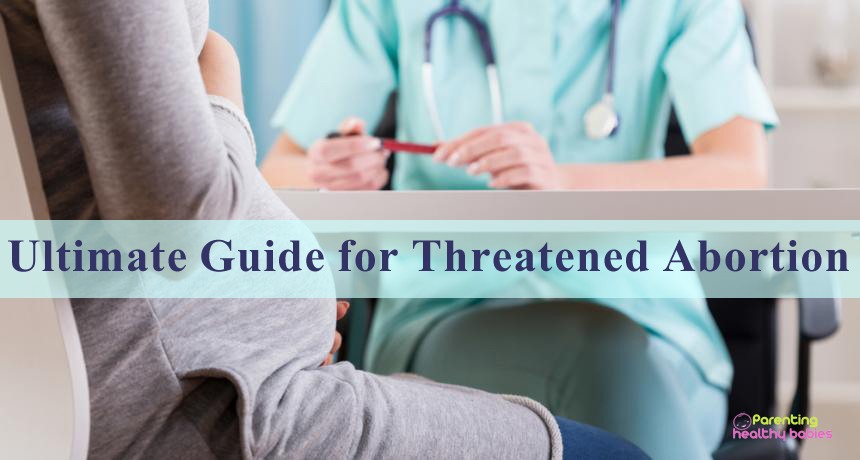A threatened abortion medically refers to a situation of heavy bleeding within the first 20 weeks of pregnancy. This is also called a threatened miscarriage because, in such a situation, miscarriage is a possible result. Sometimes, there is a prelude to this bleeding in the form of abdominal cramps. According to a medical journal called ‘Healthline’, nearly 20% to 30% of pregnant women experience this bleeding, and among them, about 50% women complete their term.
An Ultimate Guide for Threatened Abortion
The exact cause for threatened abortion is still unknown. However, based on the statistics, the major causes of a threatened abortion are:
Causes of Threated Abortion
- Minor fall or traumatic hit to the abdomen: A minor fall might result in a sudden hit or trauma to your uterus and abdomen. A hit to the abdominal area can result in an internal bruise or even a severe rupture in your placenta or the walls of your sac. This might lead to a miscarriage if not treated timely.
- Extra stress during pregnancy: Pregnancy is definitely a time that involves lots of stress and tension. However, it is advised not to stress too much as it also takes a heavy toll on your physical health. As long as you are visiting the gynaecologist on a regular basis and receiving positive and detailed feedback, you have very little to worry about. Excess stress leads to internal bleeding and might even lead to a threatened abortion due to distortion in the ratio of blood flow.
- Older in terms of maternity: Although maternity and conceiving is all about your personal life choices, it is advisable to get pregnant before or by the time you are 35 years old. Late thirties and early forties are the primary risk period in pregnancy. There is an increased chance of internal complications that might lead to unnecessary results like vaginal bleeding and threatened abortion or miscarriage.
- Constant exposure to harmful lifestyle: Your lifestyle during, or even just before your pregnancy, has a lot to do with the risk of threatened abortion or miscarriage. If you are or were a chain smoker and a daily drinker, or if you worked in an environment that had you exposed to harmful chemicals or pollen, you might be running a risk of complications in the abdomen. Make sure that you adhere to the medical recommendations by your gynaecologist and follow the diet chart strictly. If you notice even a bit of bleeding from your vagina, consult the doctor instead of waiting or diagnosing it yourself.
- Previous miscarriage(s): Women with a history of previous miscarriage; that too, multiple times; are more prone to develop complications during their pregnancy. If you’ve experienced a miscarriage, you have to be extra careful about your condition. Visit the gynaecologist on a regular basis, follow all the regulations, and inform them immediately when you notice traces of blood oozing out of your vagina.
Read more: Common Causes of Miscarriage
Symptoms of Threated Abortion
The most common symptoms of a threatened abortion are:
- Intense vaginal bleeding: Since a threatened abortion means vaginal bleeding, the most common symptom of this situation is a blood flowing out of your vagina suddenly. The moment you come across vaginal bleeding that doesn’t seem to stop or reduce, and goes on for three days or more, consult your gynaecologist without any further delay.
- Acute abdominal cramps: At times, during the first 20 weeks of pregnancy, there might be some bleeding due to changes in the body and in the internal organs. However, if the bleeding is intense and is accompanied by severe cramps in the abdomen, you know that it’s time to call the doctor.
- Excess fluid discharge: During pregnancy, white liquid discharge from the vagina is common. But you have to keep a tab on the quantity of the fluid discharged. If you notice that the fluid is coloured, yellowish, or contains streaks of blood, you might want to visit the clinic for diagnosing a lined up threatened abortion.
The common symptoms of threatened abortion must be kept in mind for helping deal with the situation better by getting the patient diagnosed timely. The diagnosis of threatened abortion is done based on these common symptoms.
- Pelvic test: The first step of the diagnosis involves a pelvic examination conducted by the doctor. During this test, the gynaecologist will assess the health condition of your cervix, uterus, and vagina. This test takes a few minutes. The doctor searches for the main point of bleeding and tries to see whether the amniotic sac has burst.
- Ultrasound test: The next step is the ultrasound scan, in which the doctor will view the source and amount of bleeding, along with the development and heartbeat of the foetus. Since a situation of threatened abortion usually arises in early pregnancy, a transvaginal ultrasound is a better medical option. In this test, the doctor inserts a medically acclaimed vaginal probe inside your vagina, and gather, images of your reproductive area with the help of ultrasound waves emitted from the probe.
- Blood test: Abnormal hormone levels can be one of the leading catalysts adding to vaginal bleeding. Hence, the gynaecologist will recommend some blood tests and a count of blood cells. The doctor will also look out for the levels of Human Chorionic Gonadotropin (HCG) and progesterone in your blood. If the levels are abnormal, then there is a deeper problem that has to be probed into.
Read more: Early Signs of Miscarriage
Remedies for Threatened Abortion
A concrete treatment for a threatened abortion is something that even experts have not yet been able to formulate. The usual ways are to improve certain lifestyle habits. Your doctor may suggest some of these basic remedies:
- Maintain a proper diet chart and follow it regularly
- Moderate exercising
- Quit drinking
- Quit smoking
- Avoid doing too much housework
- Avoid sexual intercourse while pregnant
- Avoid too much caffeine
- Avoid lifting heavy objects regularly
Apart from these domestic solutions, you might have to receive progesterone injections in order to increase the hormone level in your body. Depending on your condition, the gynaecologist may also inject an Rh immunoglobulin so that there is no development of potential antibodies affecting the blood of the foetus.
Read more: 7 Sex Positions to Avoid During Pregnancy
One of the positives to focus on, even if you face a threatened abortion-like situation and experience severe vaginal bleeding, is that almost half the women faced with such a condition make it to the delivery table. Vaginal bleeding necessarily doesn’t imply a miscarriage. To keep things safe, keep a close watch on your symptoms and call the doctor at the slightest abnormality that you experience. Otherwise, there’s no need to worry!
Read more: Side Effects of Abortion Pill













